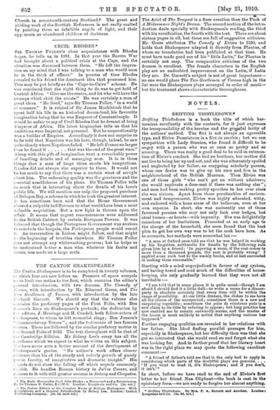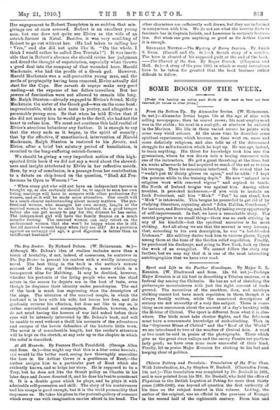NOVELS.
DRIFTING THISTLEDOWN.*
Drifting Thistledown is a book the title of which har- monises excellently with the contents, for it just expresses the irresponsibility of the heroine and the grv„eful levity of the authors' method. The flirt is not always an agreeable
type, and Elvire Dennistoun is a flirt in excelsis ; but we can sympathise with Lady Stanton, who found it difficult to be
angry with a person who was at once so pretty and so amusing. There was really a good deal to be said in extenua- tion of Elvire's conduct. She had no brothers, her mother did not live to bring her up and out, and she was alternately spoiled
and neglected by her father, an easygoing scholarly parson, whose one desire was to give up his cure and live in the neighbourhood of the British Museum. Then Elvire was one of those girls " who can't get on without admirers; she would captivate a door-mat if there was nothing else " ; and men had been making pretty speeches to her ever since she was sixteen. Apart from these peculiarities of environ- ment and temperament, Elvire was highly educated, witty, and endowed with a keen sense of the ludicrous, even at her own expense. In short, she was eminently one of those favoured persons who may not only look over hedges, but steal horses—or hearts—with impunity. She was delightfully conscious of her limitations. Promoted at an early age to the charge of the household, she soon found that the best plan to get her own way was to let the cook have hers. As to accounts, her methods were somewhat lax :-
"A man at Oxford once told me that he was helped in working up his forgotten arithmetic for Smalls by the following rule given him by a friend : 'In papering a room, if the cost comes to more than a thousand pounds, the sum is probably wrong.' I applied some such test to the weekly books, and at last succeeded in making them reasonable."
Starting with a mind unprejudiced in favour of any system, and having heard and read much of the difficulties of house- keeping, she only gradually learned that they were not all inevitable :-
"I am told that in some places it is quite usual—though I am afraid I should find it a little dull—to write a menu for a dinner- party in absolute certainty that every item will be within the range of possibility. At our little dinners, the dishes to me have all the charm of the unexpected ; sometimes there is a new and surprising vegetable • sometimes the piece de resistance puts in a new claim to its title refusing to appear; but long practice has now enabled me to remain outwardly serene, and the master of the house is most unlikely to notice that anything curious has happened."
Further engaging qualities are revealed in her relations with her father. She liked finding parallel passages for him, especially in Shakespeare, but her difficulty then was that she got so interested that she would read on and forget what she was looking for. And in further proof that her literary heart was in the right place we may quote the following excellent comment :— " A friend of father's told me that is the only test to apply in considering which parts of the doubtful plays are genuine. . . . If you want to read it, it's Shakespeare ; and if you don't, it isn't.'" In short, before we have read to the end of Elvire's first letter to her friend Nan Oliphant—the book is cast in the epistolary form—we are ready to forgive her almost anything.
• Drifting Thistledown. By Mr& P. A. Barnett and Another. London Longman., and Co. 123. ed. net.1
Her engagement to Robert Templeton is so sudden that mis- givings are at once aroused. Robert is an excellent young man, but one does not quite see Elvire as the wife of an ostrich-farmer in Natal. Besides, it was very confiding of Robert to go out without her. (He had taken to calling her " Vera," and she did not quite like it. " On the whole, I think I would rather be called Ben Trovata!") It was inevit- able that in Robert's absence she should revise her judgment and dread the thought of expatriation, especially when thrown a good deal into the company of that wounded hero, Harold Mackenzie, who had the profile of a Greek god. However, Harold Mackenzie was a self-protective young man, and the perils of propinquity having been removed, Elvire actually did
start for the Cape. Her carnets de voyage make very good reading—at the expense of her fellow-travellers. But her powers of fascination were not allowed to remain idle long. Mr. Ralph Stanton—already engaged to Elvire's friend, Molly
Mackenzie, the sister of the Greek god—was on the same boat : impressionable, with a nice taste in poetry, and altogether a personable young man. So that when he told Elvire that if she did not marry him he would go to the devil, she had not the heart to refuse him. We must not continue this bald recital of Elvire's atrocious behaviour any further. It is enough to say that the story ends as it began, in the spirit of comedy ;
that by the effective, if unauthorised, intervention of Harold Mackenzie, Ralph Stanton is restored to his fiancee, and Elvire, after a brief but salutary period of humiliation, is reunited to the long-suffering ostrich-farmer.
We should be giving a very imperfect notion of this high- spirited little book if we did not say a word about the shrewd-
ness and insight attributed to Elvire in her reflective moods. Here, by way of conclusion, is a passage from her contribution to a debate on ship-board on the question, "Shall All Pro- fessions be Open to Women "-
"When every girl who will not have an independent income is brought up, as she certainly should be, to expect to earn her own living, marriage will have to compete with other professions for women, and so it will be made more attractive. One result will be a much clearer understanding about money matters. The pro- fessional woman, who manages her own money, laughs at the married woman who has to catch her husband in a good temper before she can get money to pay for the dinners he has eaten. The independent girl will have the family finance on a much sounder footing. The married woman can only retort on the professional woman that she won't be happy when she is old. Are all married women happy when they are old? As a provision against an unhappy old age, a good digestion is better than an indifferent husband."







































 Previous page
Previous page